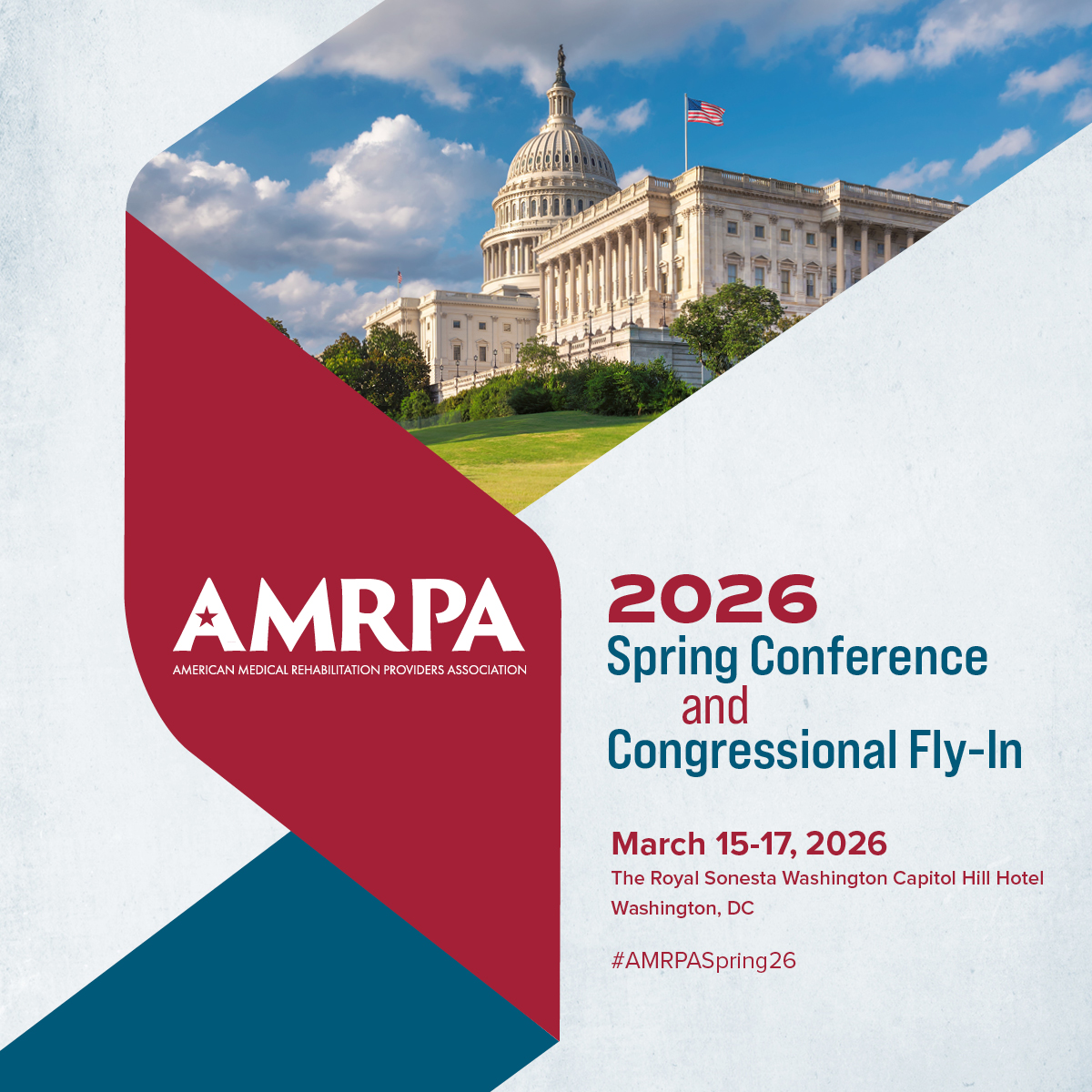Policy Priorities
AMRPA 2025 Policy Priorities
AMRPA has developed the following policy agenda to protect patient access to timely, necessary, and high-quality inpatient rehabilitation care in 2025 and beyond.
Advocacy Quick Links
Lead Field-Wide Response to IRF Review Choice Demonstration (RCD)
Continue Robust AMRPA Support for Members in Demonstration States: As the RCD expands into new states, proactively engage with AMRPA members and offer comprehensive resources, education, and operational support for hospitals subject to the demonstration.
Ensure Transparent Administration of Demonstration and Results: Utilize all available avenues to produce publicly available, regularly reported data on the demonstration, including hospital performance and impact on patient access.
Develop Consistent and Compelling Advocacy Message on RCD on Behalf of Rehabilitation Field: Identify all opportunities to hone AMRPA’s message regarding the impact of the demonstration on member hospitals and patients, and work with stakeholder partners to communicate message to all relevant policymakers.
2025 Medicare Payment Advisory Commission (MedPAC) Engagement and Education
Engage Directly with Commissioners & Executive Staff to Facilitate “Boots on the Ground” Exposure to Inpatient Rehabilitation Hospitals & the Medical Rehabilitation Field: Aim to more aggressively combat MedPAC commentary and recommendations that reflect a misunderstanding of inpatient rehabilitation as a setting and the patients served by IRF providers.
Build Relationships with the Center for Medicare & Medicaid Innovation (CMMI) Team to Address IRF Coverage and Access in Existing and Future Models
Advocate for Improved Treatment of IRFs in CMMI Models to Ensure that Efforts to Reduce Medicare Spending Do Not Result in IRF Restrictions or Under-Utilization: While AMRPA’s prior focus with CMMI centered on AMRPA’s own post-acute care payment reform concepts, AMRPA will prioritize enhanced focus on existing and proposed CMMI models.
Support Meaningful Medicare Advantage Reforms to Protect Patient Access to Care
Advocate for Meaningful Improvements to Medicare Advantage: Utilize all tools in AMRPA’s advocacy arsenal to identify needed reforms and drive change through legislation, regulation, sub-regulatory guidance, and enhanced program oversight.
Continue Strong Partnerships Across Post-Acute Care Field to Protect Robust Patient Access to Medically Necessary Care: Work closely with other provider organizations representing settings of post-acute care (including skilled nursing facilities, long-term care hospitals, and home health) to maximize field-wide advocacy on Medicare Advantage reform.
Bolster Advocacy Message on Medicare Advantage with AMRPA-Driven Data and Patient & Provider Stories: Utilize AMRPA’s survey data and member reports to build on current momentum towards Medicare Advantage reform in policy discussions and public consciousness.
Limit the Negative Impacts and Unintended Consequences of Expanding IRF Quality Reporting Program (QRP) Requirements
Produce Data-Driven Strategies to Engage with CMS on the Impacts of the All-Payer IRF-PAI Requirement: Utilize IRF-PAI data to identify potential IRF QRP compliance risks, impacts of All-Payer data on quality measures, and administrative burden of untested and inappropriate data collection for patients under the age of 18.
Reduce or Eliminate the Risk of IRF QRP Payment Penalties: Through planning, education, and legislative action, limit or eliminate reductions in IRF payment resulting from overly stringent IRF QRP requirements.
Proactively Engage in Ongoing Development and Management of IRF QRP Measures: Ensure AMRPA participation and representation in every opportunity involving the development and maintenance of quality measures used in the IRF QRP.
Continue to Strategically Engage with the OIG on Pending National IRF Audit
Continue Multi-Faceted Engagement with the OIG to Address Deficiencies in the Prior (2018) National IRF Audit: Given the negative implications of the 2018 national IRF audit (including being the likely impetus for the Review Choice Demonstration and heightened MedPAC scrutiny), the 2025/2026 follow-up audit presents an opportunity to address numerous sampling and medical review-related issues identified by AMRPA and other stakeholders. A positive audit outcome could also provide compelling arguments against the continuation of the RCD and other oversight programs.
Developing Rehabilitation Champions on Capitol Hill
Strategically Build Champions within the Current Congressional Landscape to Ensure Members are Adequately Educated about the Field & Can Meaningfully Advocate for IRF Patients & Providers.
Rejuvenate AMRPA’s Rehabilitation Research Agenda
Expand AMRPA Efforts to Support a Robust Rehabilitation Research Portfolio by Federal Agencies, Academia, and the Private Sector: Create a dedicated AMRPA Research Committee to identify and implement AMRPA priorities for rehabilitation research and expand partnerships with other national organizations to advance overarching research policy.
Advance Inpatient Rehabilitation Field through a Comprehensive Regulatory Agenda
Re-Launch Proactive Opposition to Any Expansion of the IRF Transfer Policy: While it is unknown whether, when, or how CMS may reform the current transfer policy to include home health discharges, AMRPA will build off its 2024 strategy to educate Congressional champions, relevant stakeholders (i.e., patient groups), and CMS about how patients would be directly and adversely impacted by such expansion.
Anticipate “Next Generation” of Post-Acute Payment Reform: Continue engagement with stakeholders about potential payment reforms focused on post-acute care settings and determine how to most strategically position AMRPA in such efforts.
Prepare Strategies for CMS Development of IRF Star Ratings: Identify opportunities to engage with CMS and participate in development of an IRF Star Ratings program.
Prioritize Rehabilitation Voice in Physician Pay Reform Debate: Engage with key national stakeholders to ensure that rehabilitation provider needs are addressed in broader efforts to reform the Medicare Physician Fee Schedule.
Explore Opportunities to Reform “Three-Hour Rule”: Continue supporting legislative efforts to count additional skilled therapies towards satisfaction of the Medicare intensity of therapy requirement and engage with broader stakeholder efforts to ensure all patients have sufficient access to IRF care.
Updated January 9, 2025.





